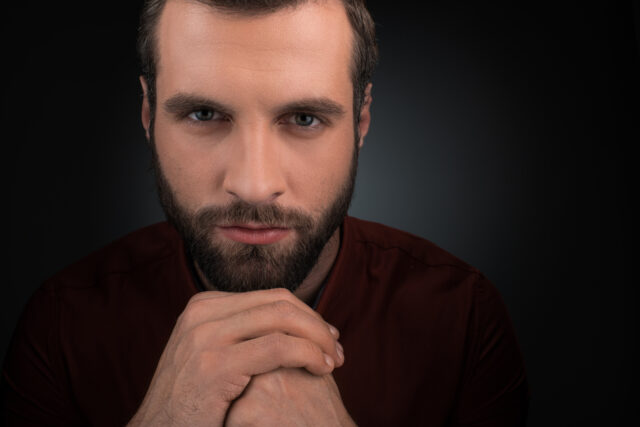Childhood experiences shape us in major ways, and sometimes, those experiences can leave us with serious baggage.

While we all carry some baggage from our past, there are signs that might indicate you need therapy to process childhood trauma and heal those wounds. If any of these resonate with you, remember, you’re not alone, and getting help is a courageous step towards healing and growth.
1. Your emotions feel like a nightmare you can’t wake up from.
 Source: Unsplash
Source: Unsplash Do your emotions swing wildly from one extreme to another? Maybe you experience intense anger outbursts, followed by deep sadness or anxiety. Or perhaps you feel emotionally numb and detached, unable to connect with your feelings. These emotional fluctuations can be a sign that unresolved trauma is bubbling beneath the surface.
2. You’re haunted by nightmares or flashbacks.

Nightmares and flashbacks are your mind’s way of trying to process traumatic events. They can be incredibly distressing and disrupt your sleep and daily life. If you find yourself reliving painful memories or waking up in a cold sweat, it’s a strong indicator that therapy could help you address and heal from these haunting experiences.
3. You avoid anything that reminds you of the trauma.

It’s natural to want to avoid triggers that remind you of the trauma, but this avoidance can become a way of life. Maybe you steer clear of certain places, people, or activities that bring back painful memories. While avoidance might offer temporary relief, it can prevent you from fully processing and healing from the trauma.
4. You find it hard to trust people or let them get close to you.

Childhood trauma can ruin your ability to trust and make it difficult to form healthy relationships. If you find yourself constantly on guard, suspicious of people’s motives, or unable to let people in, it might be a sign that you need to address past hurts and learn to trust again. Therapy can provide a safe space to explore these issues and develop healthier relationship patterns.
5. You engage in self-destructive behaviours.

Do you turn to substances, risky behaviours, or self-harm as a way to cope with emotional pain? These self-destructive tendencies can be a way of numbing yourself or trying to regain a sense of control. Therapy can help you identify healthier coping mechanisms and address the underlying issues that drive these behaviours.
6. You feel like you’re stuck in the past.

Do you feel like you’re constantly reliving the trauma, unable to move forward? Maybe you struggle to let go of anger, guilt, or shame associated with the past. Therapy can help you process these emotions, make peace with the past, and create a brighter future.
7. You have difficulty maintaining healthy relationships.

Childhood trauma can impact your ability to form and maintain healthy relationships. You might struggle with trust issues, have difficulty setting boundaries, or find yourself repeating unhealthy relationship patterns. Therapy can help you identify and address these patterns, enabling you to build stronger, more fulfilling connections with people.
8. Your physical health is suffering.

Unexplained physical symptoms like chronic pain, headaches, digestive problems, or fatigue can sometimes be linked to unresolved trauma. The mind and body are interconnected, and emotional pain can manifest physically. Therapy can help you address the root cause of these symptoms and improve your overall well-being.
9. You have low self-esteem and a negative self-image.

Childhood trauma can leave you feeling unworthy, unlovable, or fundamentally flawed. You might struggle with self-doubt, self-criticism, or a persistent sense of shame. These negative self-perceptions can permeate various aspects of your life, affecting your relationships, career, and overall happiness. Therapy can help you challenge these negative beliefs and build a more positive self-image.
10. You’re hypervigilant and constantly on guard.
 Source: Unsplash
Source: Unsplash If you grew up in an unpredictable or unsafe environment, you might have developed a heightened sense of vigilance. You might be constantly on guard, scanning your surroundings for potential threats, or reacting strongly to perceived dangers. This hypervigilance can be exhausting and make it difficult to relax and feel safe.
11. You struggle with intimacy and vulnerability.
 Source: Unsplash
Source: Unsplash Childhood trauma can make it difficult to trust people and let your guard down. You might struggle to be vulnerable, share your true feelings, or allow yourself to be truly seen. This fear of intimacy can lead to isolation, loneliness, and difficulty forming meaningful relationships. Therapy can help you explore the root of these fears and develop healthier ways of connecting.
12. You have difficulty setting boundaries.
 Source: Unsplash
Source: Unsplash If you experienced boundary violations in childhood, you might struggle to set and maintain healthy boundaries in your adult relationships. You might find it difficult to say no, feel responsible for other people’s feelings, or allow yourself to be taken advantage of. Therapy can help you learn to recognise and assert your boundaries, protecting yourself from further harm and building healthier relationships.
13. You’re drawn to unhealthy or abusive relationships.
 Source: Unsplash
Source: Unsplash Sometimes, childhood trauma can lead you to unconsciously look for relationships that mirror the unhealthy dynamics you experienced growing up. You might be attracted to partners who are controlling, abusive, or neglectful, as these patterns feel familiar and comfortable, even if they’re harmful. Therapy can help you break this cycle and develop healthier relationship patterns.
14. You feel like something is missing in your life.
 Source: Unsplash
Source: Unsplash Even if you’ve achieved external success, you might still feel an emptiness or a sense that something is missing in your life. This feeling of emptiness can be a sign that you haven’t fully processed and healed from your childhood trauma. Therapy can help you address these unresolved issues and create a more fulfilling and meaningful life.




